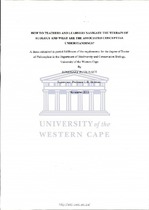How do teachers and learners navigate the terrain of ecology and what are the associated conceptual understanding?
Abstract
This thesis relates the teaching of ecology in schools to the requirements of the National Curriculum Statements, Grades R-9 and Grades 10-12, for Natural and Life Sciences. It examines the conceptual understanding of the learners to determine their level of bioliteracy. The effectiveness of various teaching strategies in enhancing bioliteracy is considered. The study was a case study involving classroom observations of Grades 4 to 7 at a primary school and Grades 8 to 11 at a high school in the Western Cape of South Africa, and the administration of a misconceptions questionnaire to learners in Grades 8 to 11. The Department of Education did not allow researchers into the Grade 12 classes. To counter this, the misconceptions questionnaire was also administered to first-year Life Science students and to students in one second-year course in the Department of Biodiversity and Conservation Biology. It was administered to a small sample of the Postgraduate Certificate in Education (PGCE) students (prospective teachers) at the University of the Western Cape, in order to determine whether misconceptions would be carried into their teaching. In-depth interviews which focussed on the particular student's misconceptions were used to verify the misconceptions which the first-year students held. The questionnaire revealed that learners lacked an understanding of photosynthesis and respiration, which forms the basis for an understanding of food chains and energy flow within an ecosystem. Learners were confused about ecology and did not understand basic concepts. The misconceptions held in high school carried over to university, as shown by the fact that the first-year Life Science students, tested before they had had any lectures, still held many of the misconceptions that were found among the high school learners. A few second-year students still held misconceptions, but their understanding of photosynthesis and respiration was better than that of first-year students. The questionnaire also revealed that learners lack language skills. Good language skills are necessary for the development of scientific literacy.

